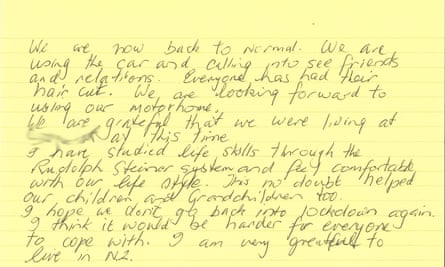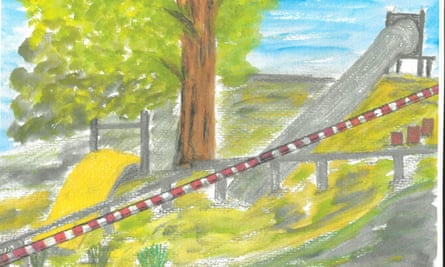A trove of nearly 800 letters recording the lockdown experiences of older New Zealanders has been collected in a University of Auckland research project called Have Our Say. Researchers appealed for written accounts of lockdown to understand how older people coped with enforced isolation, and to amplify elders’ voices. The letter writers were all over 70. Many described the importance of daily routines, their experiences during historical crises and how they stayed involved in their community. The letters will be held by the Auckland War Memorial Museum.
Here are some excerpts from the collection:
‘A forgotten group’
“It was a strange time for over 70-year-olds. Isolation to a people-person is an unusual time to say the least, no more sharing smiles, ‘and one smile does make two’ so there was a shortage of smiles, not only flour and toilet paper! Hugs and conversations were also missing from everyday life ….
This time did bring back significant memories of my time as a young child in Auckland hospital for many weeks with a kidney disease in 1950. I was confined to a single room to begin with and then a large ward where I could talk to other children from our beds. Visitors were limited, only my mother and grandmother. I didn’t see my father, brother and sister for many weeks until I went home. No going outside but we could look out window and see male patients in the TB ward enjoying the sunshine on a huge deck. ‘It’s not fair, why can’t I go outside?’
Jeff, who has vascular dementia, found isolation difficult to begin with especially from level 2 onwards as his routines were all gone! What day is it? Shouldn’t we be going walking today? A blackboard displaying day and date did help answer some of his questions.
Being over seventy, we felt we were a forgotten group, locked away out of sight and out of mind of government and society. Make them stay home and we won’t have to deal with a mountain of issues … More focus seemed to be on young families and those now not able to work.”
Doreen & Jeff Attwood, July 2020

‘I had to adapt’
“In the last 5 months I have learned another meaning for many words. Bubble, physical and social distancing, a-symptomatic, level 4 to 1 lockdowns, Click and collect, Novel coronavirus shortened to Covid or the virus became topics of many conversations and are still continuing as we negotiate through a global pandemic.
To me the government outlined, based on the best information possible, that the older generations are vulnerable. This has proved true and the effect of the virus on those in aged care homes, families and staff has been very sad.
In 2019 I travelled alone for 2 months in Europe but 5 months later I fell into the vulnerable category as announced by the government and Covid guidelines advised that I stay home and ask someone else to buy my groceries. With the world now a different place I had to adapt to find my new daily life.
Many times during the night I thought of my family who have passed on. What would they have done in a lockdown pandemic? They volunteered to go overseas and fight in World War two leaving sweethearts in New Zealand and learnt more than they ever wished to tell me. I just needed to sleep in my own bed and cook what I needed.
From one of the team of 5 million. We all have a different story.”
Beverley, August 2020

‘My time for critical transformation’
“I am getting older. There’s still much I love to do. To mow the lawn and keep fit and healthy. To pick garden-fresh vegetables for all to enjoy. To clear the forest of pest weeds and feral creatures. To protect the Manawa forests on the mudflats along the shore. To write thoughts in words that educe. To have a say in how people rule the Tangata Whenua (Māori).
Possibly, for the first time in my life, I am not doing things to suit others in the family and the whanau (family). I like it, finally, I do things that I like to do without having to think about whom I could upset; therefore, lose out on an invitation, a publication, a funded application, a promotion; perhaps, even a new job! This is my time for critical transformative action; full-time.
For me, it’s been a demanding few months through the Covid-19 infection and emergency. I want to say this to you: If this pandemic has taught this Tangata Whenua woman anything, it’s that the health, justice, economic, and conservation systems are racist — and that 70-plus-years-old women and men will never have a better prospect for transformational change than right now.”
Mere Kepa, June 2020

‘My ‘family tank’ was empty’
“I am a 73-year-old who lives alone in a townhouse. I am a retired teacher who still takes 11 children for literacy each week. I don’t have family living nearby, and had to rely on the goodwill and kindness of friends who cared for my immediate needs.
A heart health issue surfaced unexpectedly, at this time. The doctor detected an irregular heartbeat, so scans were required. Atrial fibrillation was diagnosed, and 2 medications were prescribed. After 6 weeks of this routine, I hit the wall.
I began to feel my ‘family tank’ was empty. I am not good at talking about my inner feelings but realised I had to tell a family member that the isolation from family was getting too hard. They responded and we began Zoom games meetings, bringing three families together.
During this time, I knew of a friend who lived in a flat nearby. She lives on her own and had no family here. When we got to level 3, I put two plastic chairs in the garden and carefully placed 2 metres apart, so that she could come by on her way to the New World. She would call by at least twice a week to pick up means and baking. As a result, we are now close friends who help each other out in many ways.”
Helen Campbell, undated
